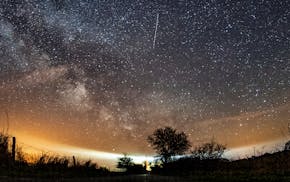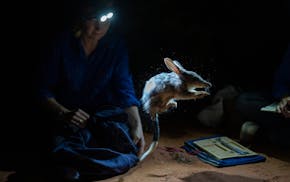If horrific hurricanes and a new, scarier-than-ever U.N. report don't change attitudes on climate change, perhaps a new report on barley will.
A small international team of scientists considered what the effect of climate change would be for this crop in the next 80 years, and they are predicting a beer shortage.
In a report in Nature Plants, researchers in China, Britain and the United States say that by the end of the century, drought and heat could hurt barley crops enough to cause pain to beer drinkers.
Of course it may seem odd to concentrate on a recreational beverage, given the damage of climate-influenced natural disasters. Chris Field, faculty director of the Stanford Woods Institute, who was not involved in the study, said that the report was based on a "solid analysis." But he wrote in an e-mail, given what is going on in terms of climate change, "It feels a tad trivial to talk about beer."
However, beer is the most popular alcoholic beverage on the planet.
One of the authors, Dabo Guan, of Tsinghua University in Beijing and the University of East Anglia, Norwich, said the report was directed at the richer countries, such as the U.S., to suggest that climate change will hit everyone, not just the poor, who could suffer dire food shortages. "We will suffer less," he said, but we will still suffer. Climate change "may not affect our bread," he said, "but it will affect our beer."
Guan said that the focus should not be on the study's precise numbers, because the models assume today's economy. But, he said, the effects are clear.
With particularly bad droughts, for example, the price of a bottle of beer in Ireland might double. In the Czech Republic, it could be six or seven times as expensive.
China and the United States drink the most beer. "Under the worst scenario," he said, China would lose 10 percent of its beer supply and the United States 15 to 20 percent.
That won't happen if Anheuser-Busch has anything to say about it, however. Jess Newman, the company's director of agronomy in the U.S., said, "We take climate uncertainty very seriously." She and her staff keep an eye on climate predictions, breed new strains of barley, and collect data on their own farms and those of suppliers in Montana, Idaho and North Dakota. "The barley nerds are on the case," she said.

The Lyrid meteor shower peaks this weekend, but it may be hard to see it

Legislation that could force a TikTok ban revived as part of House foreign aid package
![Cattle at the Wysocki Dairy CAFO (concentrated animal feeding operation) in Armenia, Wisc. in late October. ] Aaron Lavinsky • aaron.lavinsky@s](https://arc.stimg.co/startribunemedia/GNUPD5JDUEDREIFU5RKJM2EV2Y.jpg?h=91&w=145&fit=crop&bg=999&crop=faces)
Iowa environmental groups ask EPA to step in and protect drinking water

Why you should donate clothing: It (probably) won't end up at the dump
